
Tour… What?
I didn’t know my condition under the name of “Tourette’s Syndrome” until I was about 40 or so. I always referred to it as “nervous tics”. When I was first afflicted by it at the age of around 9 in the late 1960’s, none of my doctors called it “Tourettes”. In fact, they just plain didn’t know what the heck it was. Most agreed that it was some kind of a “neurosis” (huh?) but since I also had a mild chronic case of rheumatism, they opined that it was a “neurosis with a rheumatic background.” Most doctors, though not all, were of the opinion – in all their wisdom – that I was faking it, or that it was a bad habit and/or attention seeking on my part! Bless their charity. Those goddamned tic-faking kids!
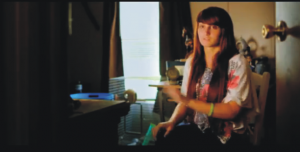 I first heard the term “Tourette’s Syndrome” when my eldest daughter was diagnosed with it (along with a few other conditions the doctors felt she also had to take meds for) when she was about 13. When I was told what it was – and subsequently read up on it quite a bit – I definitely recognized my own childhood symptoms, but my daughter had none of those. I was certain that she was misdiagnosed, and remains so to this day.
I first heard the term “Tourette’s Syndrome” when my eldest daughter was diagnosed with it (along with a few other conditions the doctors felt she also had to take meds for) when she was about 13. When I was told what it was – and subsequently read up on it quite a bit – I definitely recognized my own childhood symptoms, but my daughter had none of those. I was certain that she was misdiagnosed, and remains so to this day.
Anyway, from that point on I heard the term “Tourette’s” bandied about all over the place. I soon concluded it was another psycho-babble fad, right up there with dyslexia, ADD, ADHD, OCD and so on – any excuse to fill people with meds. Not that these conditions aren’t real, mind you – only that they’re severely overused. And then my active interest in Tourette’s gradually waned – until yesterday when I saw these poor kids suffering just like I did – apparently without hope of ever getting better. So I decided to put my experience to some good use, finally. I have a feeling that some of the things I’ve learned about this might actually help them. Fingers crossed!
My First Tics
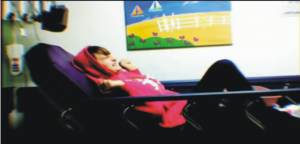 I have no idea how I first got those tics. I was about 9 and when I came home from school one day – and there they were. It took a few days and they went from mild nervous twitches to full-blown spasms that would sometimes take hours to pass. The doctors I went to first thought it could be a form of epilepsy, but that was soon dismissed. The prevailing opinions seemed to be that it was some form of hysterical, self-induced, attention-seeking form of behavior. They sure knew how to be nice to twitchy little kids.
I have no idea how I first got those tics. I was about 9 and when I came home from school one day – and there they were. It took a few days and they went from mild nervous twitches to full-blown spasms that would sometimes take hours to pass. The doctors I went to first thought it could be a form of epilepsy, but that was soon dismissed. The prevailing opinions seemed to be that it was some form of hysterical, self-induced, attention-seeking form of behavior. They sure knew how to be nice to twitchy little kids.
I was always a calm and definitely an undramatic fella, so accusations of “hysteria” were so out of character for me they didn’t even upset me very much. Even at 9 I had enough sense of humor to be able to laugh at it – secretly (we didn’t laugh at authority openly in those days).
Social Challenges
Needless to say, my condition made my social interactions difficult, initially. Some of my friends laughed at me and some called me “Twitchy”, but few ever saw my tics at their worst. There were times – especially when I was alone, not feeling the outside pressure to suppress this – that I would toss and turn like a madman, bending, twisting, jerking, making weird sounds… The works. Fun it wasn’t.
Still – thankfully – my parents didn’t see a reason for this to keep me from school (“you’re gonna be ticking AND be a dummy?”). I HATED going to school with a passion and I wished they’d just keep me home. But they did the right thing. The fact that I had to go to school regardless and face the stares and occasionally taunts and derisive laughter of other kids meant that I had no choice but to try to somehow learn how to control this thing. Either that or be scorned forever.
The Hospital Thing
At around 10 things got so bad that even my parents caved in. I got checked into a children’s hospital and for a month I was pumped full of all sorts of drugs and given daily injections which hurt no less than if a horse had kicked me in the ass.
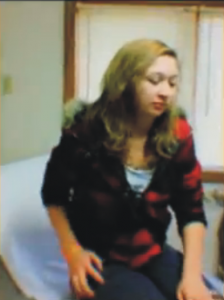 In spite of that, I remember my time in the hospital quite fondly. It was time-out from school and that alone felt like a massive reward! Also, I saw other kids who REALLY had problems. One kid had a hole in his chest you could fit a fist into, and his heart condition was so shaky we weren’t allowed to upset him for fear of severe reprisals from the staff. And he was a nasty piece of work too! He knew that everybody HAD TO walk on egg-shells around him and he acted like a spoiled little brat, knowing that the other kids wouldn’t dare retaliate for fear of the nurses. One day he ticked me off so much that I got in his face and shouted at him, telling him exactly what I thought of him… He turned greyish-pale and almost stopped breathing. Just had enough energy to yell “Help! Nnnnnnnnurse!!!” and a minute later I was informed that I was the worst monster-of-a-child that ever lived and that I “could have killed him!” Sadly, he did die about half a year later… I don’t accept responsibility for that.
In spite of that, I remember my time in the hospital quite fondly. It was time-out from school and that alone felt like a massive reward! Also, I saw other kids who REALLY had problems. One kid had a hole in his chest you could fit a fist into, and his heart condition was so shaky we weren’t allowed to upset him for fear of severe reprisals from the staff. And he was a nasty piece of work too! He knew that everybody HAD TO walk on egg-shells around him and he acted like a spoiled little brat, knowing that the other kids wouldn’t dare retaliate for fear of the nurses. One day he ticked me off so much that I got in his face and shouted at him, telling him exactly what I thought of him… He turned greyish-pale and almost stopped breathing. Just had enough energy to yell “Help! Nnnnnnnnurse!!!” and a minute later I was informed that I was the worst monster-of-a-child that ever lived and that I “could have killed him!” Sadly, he did die about half a year later… I don’t accept responsibility for that.
It Could Be Worse
As you can imagine, being surrounded by kids like that, it didn’t take me very long to realize that my condition, as bad as it was, was actually nothing by comparison. In fact, I wouldn’t have switched places with them! By comparison, I felt blessed. That was a good mindset to have for a kid like me and I would never have thought of it had it not been for the hospital.
I checked out of the hospital a month later, my condition not having improved one least bit. But then a doctor told my mom something which would change my life forever. He simply said “He’s got this for life. He’s never going to be cured.”
I remember that moment like it was yesterday. I was “the kid”, so he spoke in front of me like I didn’t exist, not giving much thought to how that might make me feel. I’m SO grateful he did. Nothing beats honesty! And I also remember my ultra-urgent thoughts as soon as I heard that. I immediately realized that I was on my own and whether or not I could prove that doctor wrong was entirely in my hands. Quite a profound insight for a 9-year-old. Well, I’ve proven him wrong, as you’ll see!
You’re On Your Own Kid!
 Having no outside help or even solid advice from anyone (other than sporadic shrieks like “stop this for chrissake!”) – not counting my mom’s loving, but fruitless attempts to make things better for me – was a blessing in disguise. It allowed me to assume full responsibility for my condition and for the first time “empower” me to do something about it.
Having no outside help or even solid advice from anyone (other than sporadic shrieks like “stop this for chrissake!”) – not counting my mom’s loving, but fruitless attempts to make things better for me – was a blessing in disguise. It allowed me to assume full responsibility for my condition and for the first time “empower” me to do something about it.
Nothing stops self-healing like over-reliance on others to do it for you.
Naturally, I had no idea where to even begin, but the one thing I did figure out was that I could perhaps “fake NOT having it.” Easier said than done.
Redirection
Try as I might, the tics were stronger than my will power. But then one day I had the idea of “redirecting” my tics. So, if my head was bobbing up and down, I tried to will my arm to twitch instead. I went with them rather than against them. I only steered them “my way”. If I couldn’t stop grunting, I tried to get my eyes to blink instead. I tried this sort of thing earlier on as well but without the “methodical approach” I was now adopting, and this time I was able to do it quite successfully. This was a major victory, even though it only lasted a few seconds at a time. For the briefest time I was able to order my face to stop twitching and got my arm to twitch instead. Woo-hoo!
Initially, these little victories were very short-lived only. I might have stopped a facial tick for 10 seconds and transfer it to my leg or arm – but then it would return with a vengeance in places I didn’t even think about! But it WAS a victory. Where there’s 10 seconds, there’s 20. Where there’s 20 seconds – there’s a minute. And where there’s a minute, there’s an hour.
Life’s Little Victories
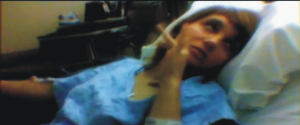 I experimented with this “tic transference” a lot. At one point I discovered that I could “grunt” or make sounds, or blow air through my nose in little bursts, and that would clearly bring relief to my other tics.
I experimented with this “tic transference” a lot. At one point I discovered that I could “grunt” or make sounds, or blow air through my nose in little bursts, and that would clearly bring relief to my other tics.
Of course this was almost worse for my family and friends! Not only did they have to endure my ticks, but now they also had to put up with those annoying little grunts! “Cut the sound effects PLEASE!”
Thankfully, I was mentally strong enough to know I didn’t really care! I realized I was beginning to gain a small measure of control – and I was really hopeful that I would be able to beat it eventually.
Over time, my tics subsided to the point where I could go for 10 minutes without anyone noticing there was anything “wrong” with me. But when I’d let them come out – boy did they come out! I’d tic away for a good few minutes and then be able to force myself back into control – and then I have another 10 minutes of relative peace.
By the time I was 11, I could go for 30 minutes without anyone even noticing!
The First Major Breakthrough
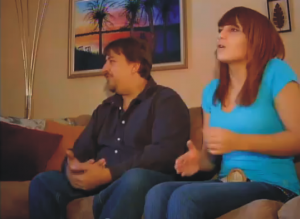 And then I did something which vastly accelerated my “recovery.” I signed up for Tae Kwon Do at the local “Y”. I loved it with a passion and I noticed that my tics almost disappeared during training. In fact, I could go for an hour or two without a tic in sight! After training, however, they’d always come back with double force as if saying “you forgot about us for all this time, here we are, your lifelong companions!”
And then I did something which vastly accelerated my “recovery.” I signed up for Tae Kwon Do at the local “Y”. I loved it with a passion and I noticed that my tics almost disappeared during training. In fact, I could go for an hour or two without a tic in sight! After training, however, they’d always come back with double force as if saying “you forgot about us for all this time, here we are, your lifelong companions!”
I had the good fortune that my “master” was a guy who was deep into meditation and philosophy, and since he was my “hero”, I badly wanted to be just as great as he was. And he said “meditate”, so I did.
The whole point of meditation is to achieve a calmness of mind, body and spirit. My initial attempts were constant ticking bouts. I couldn’t sit still without twitching, sometimes in a really ugly way too! But then another TaeKwonDo exercise came to my rescue.
Breaking The Tension
One of the exercises we did was executing techniques “with tension”. So if we did a punch, for example, rather than blasting it out at full speed, we’d force ourselves to do it as slow as possible with maximum tension of all the muscles, as if extracting something deeply stuck in some very sticky mud. It worked even better with “tension kicks” because it was harder to maintain balance.
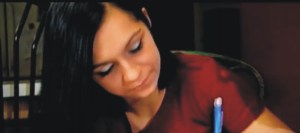 I discovered that the more slow and deliberate I was in executing those techniques, the less I “needed” to tic! What would happen is that AFTER I finished the exercise, the tics would return with redoubled force, but I now knew I had found yet another tool that would help me control it.
I discovered that the more slow and deliberate I was in executing those techniques, the less I “needed” to tic! What would happen is that AFTER I finished the exercise, the tics would return with redoubled force, but I now knew I had found yet another tool that would help me control it.
So next time I tried my tic “re-direction” from, say, my arm to my grunts or from my face to my legs, I would instead allow the tic to happen, but I would only attempt to slow it down. With a little practice I could slow even my facial tics down to a crawl, where an outside observer might only perceive it as a sort of a grimace or a weird stretch – but NOT a tic!
By the time I was maybe 12 or 13, I was more or less fully in control of my own body. I still had the tics and they’d still slip out, but I was no longer a major “social embarrassment”.
Also, whenever I needed quick relief, I developed these super-fast punches and kicks which felt as if they were powered by springs! I turned out to be a pretty mean little TKD fighter after a while, faster than just about anyone else I met at the time! I KNEW even then that this energy was somehow coming from my “nervous tics”.
Gaining Control
As my training continued, I got more and more control over this thing, until by the time I was around 20 I could hold it in indefinitely! Gone were the fears that I would never find a girlfriend or that I would be a social outcast forever.
Since then, I’ve had short-lived recurrences, usually only in times of deep stress and sometimes also when I’d get a flu or something. But even in those moments all I needed was to remind my body of who the boss is – and I’d eventually regain total control.
Discovering the Way In
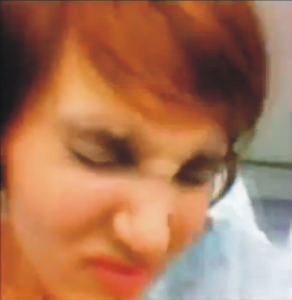 Until yesterday when I saw that documentary, I’ve gone for years without even thinking about my tics, never mind having them. But the weird thing was that as I was watching, my tics started forcing their way out again! For the first time in ages I felt my face twitch, my throat and nose beginning to make those annoying little grunts…
Until yesterday when I saw that documentary, I’ve gone for years without even thinking about my tics, never mind having them. But the weird thing was that as I was watching, my tics started forcing their way out again! For the first time in ages I felt my face twitch, my throat and nose beginning to make those annoying little grunts…
As soon as I realized what was going on – I stopped it cold. But even today, just thinking about it brings on that “urge” to allow myself to tic again! Does Tourette’s have a copycat element in it? Perhaps to some small extent… But only if you already have it!
There does seem to be a strong psychological element in this condition. It is NOT, however, what it’s about. In fact, it’s the other way around. It’s a physical condition which then brings on a psychological dimension along with it. Be that as it may, the psychological component is the way in.
Every Cloud Has a Silver Lining
As with anything in life, this cloud too has a silver lining. You only need to be willing to observe it and build on it.
I’m not sure my BENEFITS from this condition will be the same as yours – but I don’t really see why not.
Firstly, let me assure you that I do perceive this experience as a HUGE BENEFIT. It’s one of those mixed blessings without which my life would have been quite different. Perhaps better – but perhaps worse. Who’s to say. But from where I stand now, I can’t wish for a better formative experience! Allow me to tell you some of the benefits which I think you too will experience once you open yourself to the possibility.
Mind Over Matter
I credit my Tourette’s with my intellectual as well as social development and growth. Having to deal with this challenge and having the good fortune of my parents forcing me to live a normal life (including attending that dreaded school) meant that I had to develop a sense of humor really fast. I also had to develop some thick skin real fast. And I had to discover my own will power. The lazy bum that I can be I would never have discovered that on my own!
All that lead me to develop a sense of curiosity about life and all sorts of things, which I then proceeded to research and read about with an extra sense of urgency that possibly only a condition like this can bring on.
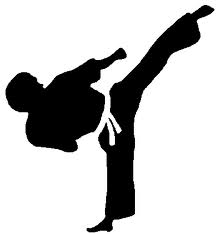 I also credit the growth of my intelligence to this condition and everything that resulted from it. At the risk of coming across as an “IQ snob” of some sort, let me give you a quick story here. When I was about 7, my school had some psychologists come and run IQ tests on us kids. I scored 128 which was considered really great. I got called Einstein after that. Soon after my tics started at 9, one of the obvious suspicions was that I was somehow psychologically imbalanced, and among the battery of other tests I was made to take, I also had to take another IQ test. It came out at 132, i.e. roughly the same. Much later, having already put in years of effort in self-development and controlling this thing, when I was about 16 or 17 I got another test and it came out at 148. When I told the shrink about my “intelligence growth” he laughed and said something to the effect that “intelligence doesn’t grow – only knowledge does.” By the time I was at university, probably around 20 or 21 at that time, there was another psychological test they ran across the whole place, testing every student. I clocked in at 163 points and had the highest IQ in my department (while at the same time, admittedly, I was probably the worst physics major they ever saw!).
I also credit the growth of my intelligence to this condition and everything that resulted from it. At the risk of coming across as an “IQ snob” of some sort, let me give you a quick story here. When I was about 7, my school had some psychologists come and run IQ tests on us kids. I scored 128 which was considered really great. I got called Einstein after that. Soon after my tics started at 9, one of the obvious suspicions was that I was somehow psychologically imbalanced, and among the battery of other tests I was made to take, I also had to take another IQ test. It came out at 132, i.e. roughly the same. Much later, having already put in years of effort in self-development and controlling this thing, when I was about 16 or 17 I got another test and it came out at 148. When I told the shrink about my “intelligence growth” he laughed and said something to the effect that “intelligence doesn’t grow – only knowledge does.” By the time I was at university, probably around 20 or 21 at that time, there was another psychological test they ran across the whole place, testing every student. I clocked in at 163 points and had the highest IQ in my department (while at the same time, admittedly, I was probably the worst physics major they ever saw!).
I never took another IQ test since then, knowing that things could only go downhill from there! I was also reassured in my own knowledge that intelligence can indeed grow and develop as it is being shaped by life’s experiences – irrespective of the “knowledge” one accumulates. And I don’t hesitate to assert that my own IQ would almost certainly NOT have developed as well without my “Tourette’s” blessing-in-disguise!
By the way, if you think that IQ testing can be learned and improved (i.e. “faked” to some extent) – you’re absolutely right. Practice does make perfect. But I also know without any doubt that at the time I was the most active in trying to combat Tourettes, I also had the highest, totally palpable, clarity of mind.
Persistence & Endurance
I also credit Tourette’s with my ability to work with full focus for hours on end. Sure, some might say that it’s not a great thing to be a “workaholic”, but when your work is your hobby – it ain’t work, is it?
I can go 14-16 hours per day multitasking or focusing at will without feeling the strain in most cases. I’ve had (admittedly foolhardy) times in my life where I’d go for 2 and even 3 days without sleep – just working on whatever it was that tickled my attention. I don’t do that any more.
Again, I link this ability to my VICTORY over Tourette’s. It took determination and focus for me to beat it, and compared to that, other work seems easy. Sometimes a little “nervous energy” is a good thing you see.
Critical Thinking
Because this condition is so rare (or at least it WAS rare when I first got it), I was exposed to advice, diagnoses and ideas which were more often than not PLAIN WRONG and occasionally, possibly, mean-spirited. But who was I to argue with the learned experts! In fact, I didn’t have “permission” to disagree. If I voiced my objections to particular assessments of my condition, I would be told things to the effect that “they know better.” After a while, however, I refused taking any medications initially only pretending to take them but actually throwing them into the garbage. I realized very early on that they’re giving me meds for something they don’t know how to treat – so how could it possibly be the right meds?
 This has soon blossomed into a very healthy skepticism of authority. Authority must be earned or else it’s not authority, wouldn’t you agree? By the time I was maybe 10 I already knew that on a subconscious level. By the time I was 20, I relied on no one else to make my own mind up and develop my own insights into life and its meanings. Sometimes with disastrous consequences, of course, but that’s goes with the territory. Tourette’s has also taught me to be selective and critical, without losing optimism and a positive outlook on life. When I pick my “heroes” I never do it blindly any more.
This has soon blossomed into a very healthy skepticism of authority. Authority must be earned or else it’s not authority, wouldn’t you agree? By the time I was maybe 10 I already knew that on a subconscious level. By the time I was 20, I relied on no one else to make my own mind up and develop my own insights into life and its meanings. Sometimes with disastrous consequences, of course, but that’s goes with the territory. Tourette’s has also taught me to be selective and critical, without losing optimism and a positive outlook on life. When I pick my “heroes” I never do it blindly any more.
Not only has Tourette’s taught me that I don’t have to accept anyone’s say-so merely based on their supposed authority, but also that I’m the ultimate master of my own destiny.
Social Strength
One of the biggest GIFTS I received from Tourette’s is my thick skin. It takes quite a bit to shake me or to offend me. Tourette’s has taught me self-confidence even when I KNEW that I came across as a freak of some kind at least to some people! It taught me to read people and know their measure much better as a result.
It also gave me a firm knowledge of where I belong in society and who I am. I am who I LIKE to be. Most of the time.
 When I was in my late teens, it was THE thing for us wild kids to get drunk out of our skulls. I went to every crazy party I could find and would imbibe everything and anything that had the word “proof” on it – only to suffer the usual headaches and nausea the next day (though I always denied it). I never liked how the stuff tasted, but I drank like a fish because all my friends drank like it was a competition and a code of honor. I wanted “to belong”, I guess. One day I got really sick and woke up the next morning with a killer hangover. After throwing up a few times I thought to myself: “This is sheer idiocy! I don’t even like this stuff and I can sure live without the artificial buzz. I’m gonna stop.” When I went to my next party with my wild friends, I politely refused to drink. But the “social pressure” was unimaginably strong. “Come on, Paul! Have a drink! Don’t be an ass!” I gave in and next day I was sicker than ever. That was the last time I gave in and since then I never touched alcohol again – or any other mind-altering substances. I do enjoy cigarettes, however! (Don’t argue with me on that one). Today I can have a small drink if I “have to”, but I myself make that choice. My ability to resist the huge pressures that peers can exert on a person was one of the keys to discovering myself and living the life I chose, rather than living the life my peers chose for me.
When I was in my late teens, it was THE thing for us wild kids to get drunk out of our skulls. I went to every crazy party I could find and would imbibe everything and anything that had the word “proof” on it – only to suffer the usual headaches and nausea the next day (though I always denied it). I never liked how the stuff tasted, but I drank like a fish because all my friends drank like it was a competition and a code of honor. I wanted “to belong”, I guess. One day I got really sick and woke up the next morning with a killer hangover. After throwing up a few times I thought to myself: “This is sheer idiocy! I don’t even like this stuff and I can sure live without the artificial buzz. I’m gonna stop.” When I went to my next party with my wild friends, I politely refused to drink. But the “social pressure” was unimaginably strong. “Come on, Paul! Have a drink! Don’t be an ass!” I gave in and next day I was sicker than ever. That was the last time I gave in and since then I never touched alcohol again – or any other mind-altering substances. I do enjoy cigarettes, however! (Don’t argue with me on that one). Today I can have a small drink if I “have to”, but I myself make that choice. My ability to resist the huge pressures that peers can exert on a person was one of the keys to discovering myself and living the life I chose, rather than living the life my peers chose for me.
Artistic Dimensions
I was into music ever since I was 4, so in the years I had the worst of Tourettes, it was a beautiful escape. Since I play piano along with a few other instruments, it was a real challenge to play as well as I could – without letting the tics get in the way. I’ve even developed some styles of playing which owed not a little bit to this whole shaking thing!
Again, I’m not sure I would ever have progressed as much as I did, had music not been something of a “desperate” escape for me.
Taking Charge
It is not my intention here to self-glorify or to make more out of my experience than it is. If I sound smug, okay, so? My intention here is to make you aware that if you have this condition, YOU can look forward to rich rewards – if you’re prepared to accept them. You’ll need to reclaim your control. That’s all.
I turned out all right – and so will you.
I got a LOT richer as a result of this little challenge – and so will you.
I’m happy to share my experiences with you, in the hope that it might help you – and you will do the same one day, to help another person in that position.
Let’s drink to that, shall we? Only I’ll have mine black and with a little sugar!
5 Responses to “A Case Study – My Own”

 I'm a music producer / songwriter and have also been doing syndicated radio on ABC, Stateside. I'm also an entrepreneur...
As a child, I had this condition now known as "Tourette's Syndrome" and I managed to conquer it to a point where you would never know it looking at me. I have always considered Tourettes as one of the main driving forces in my life. It's a blessing in disguise!
I'm a music producer / songwriter and have also been doing syndicated radio on ABC, Stateside. I'm also an entrepreneur...
As a child, I had this condition now known as "Tourette's Syndrome" and I managed to conquer it to a point where you would never know it looking at me. I have always considered Tourettes as one of the main driving forces in my life. It's a blessing in disguise!
Excellent post. Thanks.
Fabulous article from someone who has been there and lived it… I take no advise on how to beat the Tourettes symptoms from Drs. who have never had these symptoms them selves, they have no idea!!! It is stories like this that give hope to those of us who suffer… THANK YOU. IF you ever see this, Id love to speak to you for a bit rkuzich@msn.com… THANKS,Rob
If ever you need to ask more technical or in-depth questions about this, you can write me on paul@meermusic.com. I can’t guarantee a speedy reply due to massive workload at this time, but I will definitely reply in the end.
Hi blogger, i must say you have hi quality content here. Your page should go viral.
You need initial traffic boost only. How to get it? Search for: Mertiso’s
tips go viral
Thank you so much for your post. I’m from Vietnam, where tourettes is not popular and hardly anyone knows about it. My son has developed Tourettes symptoms for 5 months now. He is just 5 and a half years. I have spent days crying and blaming myself for his imperfection. I’m desperate to think of his future and how he could live with all the social stigma and bullying. Your post has given me more strength and belief that my son could be fine. I’m sure life has forever changed for my family and my son, but we will fight till the end. Tks, again